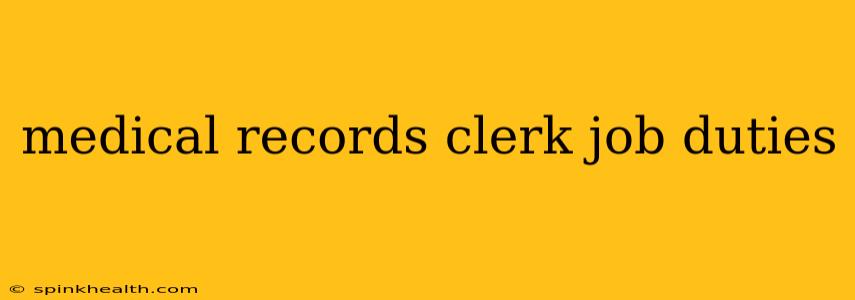The rhythmic tap-tap-tap of keys, the hushed whispers of colleagues, the quiet hum of the air conditioning – this is the soundtrack of a medical records clerk's day. It's a job that often goes unseen, yet plays a vital role in the smooth functioning of any healthcare facility. But what exactly does a medical records clerk do? Let's dive into the day-to-day tasks and responsibilities, uncovering the intricacies of this essential role.
Imagine yourself starting your day. Your first task might be processing incoming medical records. This could involve anything from scanning paper charts into electronic health records (EHRs) to verifying the accuracy of patient information and ensuring all necessary documentation is present. Accuracy is paramount; a single misplaced file could have serious consequences.
Key Responsibilities: A Closer Look
This sets the stage for a typical day. Here's a breakdown of the core responsibilities you'll encounter:
1. Maintaining Patient Records: This is the heart of the job. You'll be responsible for organizing, storing, and retrieving patient records – both physical and electronic. This includes:
- Filing: Ensuring records are filed correctly and efficiently according to established protocols.
- Retrieval: Quickly and accurately locating records when requested by physicians, nurses, or other healthcare professionals.
- Data Entry: Inputting patient information into the EHR system, ensuring data integrity and accuracy.
- Scanning: Converting paper documents into digital format, maintaining a high level of accuracy and efficiency.
2. Record Requests and Releases: Privacy is paramount. You'll handle requests for medical records, ensuring compliance with HIPAA regulations and other privacy laws. This often involves:
- Processing Authorizations: Reviewing and verifying authorization forms for the release of medical information.
- Responding to Inquiries: Answering questions about record requests and providing updates on processing times.
- Redacting Information: Removing sensitive or protected health information (PHI) from records before release as per regulations.
3. Quality Control and Data Integrity: Accuracy is non-negotiable. You are the guardian of patient data. Your duties include:
- Auditing Records: Periodically reviewing records to ensure accuracy, completeness, and compliance with standards.
- Identifying and Correcting Errors: Identifying and correcting errors promptly, ensuring the integrity of the medical record.
- Maintaining Confidentiality: Strictly adhering to confidentiality protocols to protect patient privacy.
Frequently Asked Questions (FAQs) about Medical Records Clerk Job Duties
What skills are necessary to be a successful medical records clerk?
A successful medical records clerk needs strong organizational skills, meticulous attention to detail, a commitment to accuracy, and excellent data entry skills. Knowledge of medical terminology is essential, as is proficiency in using electronic health records (EHR) systems. Strong interpersonal skills are also needed for effective communication with healthcare professionals and patients.
What kind of software do medical records clerks typically use?
Medical records clerks regularly use various software systems, including EHR (Electronic Health Records) systems like Epic or Cerner, practice management software, and document imaging software. They might also use database management systems for record keeping and retrieval.
What is the career progression for a medical records clerk?
A medical records clerk role often serves as a stepping stone to other positions within the healthcare field. With experience and additional training, individuals can advance to positions like medical records supervisor, health information manager, or even pursue further education in health information management.
What is the difference between a medical records clerk and a medical coder?
While both roles work with medical records, their responsibilities differ significantly. Medical records clerks focus on the organization, storage, and retrieval of records, whereas medical coders analyze patient records to assign numerical codes for billing and insurance purposes.
Are there any certifications available for medical records clerks?
While not always required, certifications like the Registered Health Information Technician (RHIT) or Registered Health Information Administrator (RHIA) can enhance career prospects and demonstrate a commitment to professional development.
In essence, the medical records clerk is the silent guardian of patient information, ensuring accuracy, confidentiality, and accessibility. It's a challenging yet rewarding role for individuals with a keen eye for detail, a commitment to accuracy, and a passion for healthcare.

